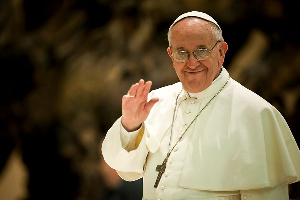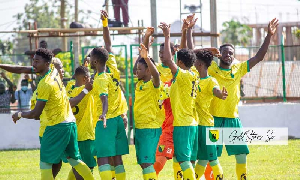After five long years of litigation over the sale of Ghana Telecom (GT) to Vodafone International BV of the UK, the Commercial Division of the High Court has concluded its evidence — gathering for onward submission to the Supreme Court for interpretation.
Parties in the case have, therefore, been directed by the presiding judge, Mrs Justice Gertrude Torkonoo, to file their addresses on or before July 31, 2013.
Last witness
But before the evidence — gathering was concluded on Wednesday, the last witness, Mr Kwame Jantuah, the Executive Director of Peace Petroleum Company Limited, told the court that the five other plaintiffs took the matter to court in their capacity as concerned citizens and that their decision to challenge the Sale and Purchase Agreement (SPA) was informed by the anomalies that were in breach of the 1992 Constitution.
He said the plaintiffs sent a petition to Parliament on July 24, 2008 calling on it not to ratify the SPA. The petition, he said, was received by a former First Deputy Speaker of Parliament, Mr Freddie Blay, a former Second Deputy Speaker of Parliament, Alhaji Malik Yakubu and the immediate past Member of Parliament for Ayawaso West Wuogon, Mrs Akosua Frema Opare.
Mr Jantuah explained that the SPA was withdrawn from Parliament for some amendments to be effected before the amendment version was later submitted to the House.
He said after Parliament had ratified the agreement, the plaintiffs decided to amend their writ of summons.
Buttressing his claim with reference to the original agreement, Mr Jantuah observed that the SPA was signed on behalf of the government of Ghana by former Finance Minister, Mr Kwadwo Baah-Wiredu and Dr Anthony Akoto Osei, a former Minister of State at the Ministry of Finance in the Kufour-administration while a former Chief Executive of GT, Mr Dickson Oduro, initialled for the company.
What for him was interesting was the fact that the portion for Vodafone BV was signed but without a name accompanying the signature.
Mr Joe Ghartey subpoenaed to testify
The court summoned the Second Deputy Speaker of Parliament, Mr Joe Ghartey, to appear before it and testify in the litigation.
An original subpoena was served on him sometime last year and as a result, he appeared in court in the company of his lawyer, Mr Frank Davies, on May 22, 2012, but the court could not hear him because a witness from the Ministry of Communication was by then in the box testifying.
Mr Ghartey was, therefore, granted leave to absent himself until the court was ready for him.
When the mantle finally fell on him to appear, he was absent because it emerged he had probably not been served with a new hearing notice.
Although, the court’s record indicated that at 9.50 a.m. on June 14, 2013, the Clerk of Parliament had been served with a hearing notice with the previous subpoena issued in 2012 attached, it was not clear whether or not Mr Ghartey had received the said hearing notice.
Following from that, the presiding judge, Mrs Justice Gertrude Torkonoo, a Court of Appeal judge with additional responsibility as a High Court judge, issued a new subpoena and adjourned the case to Monday, June 24, 2013.
She also directed that a hearing notice be served on Mr Ghartey by June 20, 2013.
When he finally took the witness stand to give his testimony, he described the SPA as constitutional when he was cross examined by Mr Akwetey, explaining that as Attorney General at the time, the entire transaction went through due process.
Resumption of the case
The litigation resumed at the Commercial Court in April 2012, following the Court of Appeal’s dismissal of an application for stay of proceedings at the Commercial Court.
Vodafone had gone to the Court of Appeal praying it to stay proceedings at the Commercial Court, as well as stop the court from receiving documents on the sale of Ghana Telecom to Vodafone with the reason that the Supreme Court, which was billed to hear constitutional aspects relating to the transaction, had not requested for such documents.
Following the Court of Appeal’s decision, the Commercial Court, on April 4, 2012, continued to take evidence.
In October, 2009, the Commercial Court, presided over by Mr Justice Henry Kwofie, ruled that it was not competent to deal with issues bordering on the constitutionality or otherwise of the sale and accordingly in November, 2009, Mr Justice Kwofie referred issues on the constitutionality or otherwise of the sale to the Supreme Court for determination.
However, the Supreme Court in March, 2010 described the referral as premature. The court was of the view that some relevant materials which raised fundamental issues had not been put before it by the lower court and accordingly directed the lower court to gather relevant documents to enable it to decide thoroughly.
Plaintiffs in the matter
The plaintiffs in the matter, Professor Agyeman Badu Akosa and five others, sued the Attorney-General and Minister of Justice, Ghana Telecommunications Company Limited and the Registrar General over the sale of Ghana Telecom to Vodafone. The other plaintiffs, who are all members of the Convention People’s Party (CPP), are Mr Michael Kosi Dedey, Dr Nii Moi Thompson, Naa Kordai Assimeh, Ms Rhodaline Imoru Ayarna and Mr Kwame Jantuah, and they are calling for a declaration that the sale of GT is inimical to the public interest.
Reliefs
They are seeking reliefs from the court, including a declaration that the agreement entered into by the government was not in accordance with due process of law and is, therefore, a nullity.
They are also requesting an order declaring that the forcible grouping of autonomous state institutions established by law — Voltacom, Fibreco, VRA Fibre Network and VRA Fibre Assets — with GT to form the purported Enlarged GT Group was unlawful and, therefore, void and of no legal effect.
They are contending, among others, that the SPA entered into among the Government of Ghana, GT and Vodafone for the sale of 70 per cent of GT for $900 million was against the public interest and constituted an abuse of the discretionary powers of the government.
General News of Friday, 12 July 2013
Source: GNA
Court concludes evidence-gathering on Ghana Telecom case
Opinions












